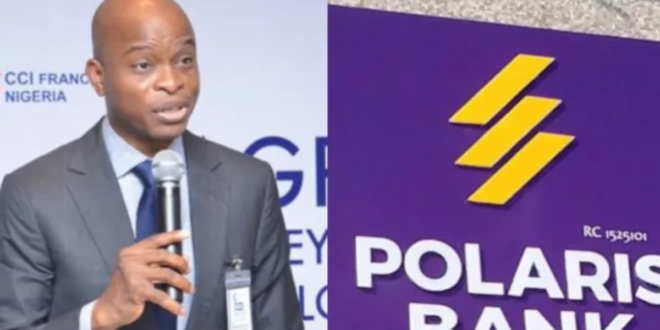...To get all news updates, Join our WhatsApp Group (Click Here)
Also Join our WhatsApp Channel (Click Here)
Ahead of Nigeria’s anticipated political transition, with president-elect Bola Tinubu’s inauguration scheduled for 29 May, speculation is mounting over the fate of Polaris Bank Limited, as the incoming helmsman, is said to be gearing up to reverse its ‘controversial sale, WE learnt. Recall that Polaris Bank was nationalised in September 2018 after AMCON bought its debts. It was known as Skye Bank until the takeover.
Skye Bank had been a product of two mergers and six legacy banks. National Bank and Prudent Bank had first merged during the first banking reform in 1998, when banks’ share capital was raised from N200 million to N500 million. In 2005, following the consolidation exercise which raised the capital base to N25 billion, National Bank merged with four other banks: Bond Bank Limited, EIB International Bank Plc and Eko International Bank owned by the Lagos State government, Reliance Bank Limited and Co-operative Bank Plc. to form Skye Bank Plc. Tunde Ayeni, who is said to have had strong interest in the emergent bank, had founded Bond Bank, one of the merging banks in 2000, and by 2010, he had emerged as chairman of Skye Bank board. The initial years of Ayeni at the helm brought good fortunes to the bank, which was largely the banker of the Lagos State government. But things began to go downhill in 2014 when the bank’s profit before tax plunged to N10.5 billion, and its profit after tax dipped to N9.7 billion as against N18.5 billion reported in 2013.
Things were to go from bad to worse. Year 2014 was to be the last year the bank would release its annual report. By June 2015, the bank had made a loss N40 billion and its capital adequacy had plunged to about 10 per cent, far below acceptable standard of 16 per cent for Systemically Important Banks (SIB) of which Skye was one. And by December 2015, it had lost over 55 per cent of its share value (from N3.58 in June 2014 to N1.58 in Dec 2015). Its liquidity ratio had gone down to 8 per cent as opposed to minimum regulatory requirement of 30 per cent. Its’ Loan to Deposit Ratio was at 98 per cent, against recommend ratio of 80 percent. Skye was on a free fall. So bad were the results that it could not file its audited report for 2015. In March 2016, it had sought a 4-week extension to file the report, but it never did. And throughout the year, the market became increasingly distressed. Analyst issued sell recommendations. The implementation of Treasury Single Account (TSA) delivered another heavy nail on the bank’s coffin. The bank had been heavily dependent on public sector funds. It lost estimated N125 billion to TSA. Having seen enough, the CBN, in June 2016, wielded the hammer. It sacked the board and took control of the bank’s management. It subsequently named a new board with Muhammad Ahmad as the new chairman and Adetokunbo Abiru as new group managing director, to take over from Timothy Oguntayo. Abiru, a Tinubu’s loyalist, sources say, was drafted to oversee the bank to protect the president-elect’s interest.
Ayeni, along with Timothy Oguntayo, the bank’s former group managing director (GMD), were subsequently arraigned before Justice Valentine Ashi of the Federal Capital Territory High Court, Apo, by the Economic and Financial Crimes Commission (EFCC), on a four-count charge relating to criminal breach of trust to the tune of N4.6 billion, but the case appeared to have stalled. And on September 21, 2018, the CBN finally took the decision to revoke the license of Skye Bank. It created a bridge bank to take over its assets and liabilities. That bridge bank became Polaris Bank.
Abiru, however, retired from the bank in August 2020 to pursue his senatorial ambition in a bid to replace Bayo Osinowo, the former lawmaker representing Lagos East Senatorial District who died after a brief illness in June 2020. On his exit, Abiru was said to have convinced the president-elect to allow Innocent C. Ike, the then executive director, Technology & Services of the bank, believed to be his loyalist to oversee the operations of the bank with the promise that his interest would be protected. But to the shock of the then management of the bank, Ike, we learnt was in the United Kingdom when he read of his sack, the takeover of the bank and the appointment of Mr. Adekunle Sonola as the new managing director/CEO of the bank.
In October 2022, the CBN sold the bank for a paltry N40 billion under controversial circumstances, after sinking over N1.2 trillion into it. Predictably, it triggered a wave of allegations: lawmakers, trade unions, and other opponents of the deal all cried foul. The apex bank, it was gathered, sold the bank late 2022 for roughly N40 billion to Strategic Capital Investment Limited (SCIL), said to be promoted by Auwal Lawan Abdullahi, a son-in-law of Ibrahim Babangida who holds the Sarkin Sudan Gombe traditional title from the north-eastern state, despite his limited credentials in banking and finance. Mr Abdullahi was described as a commercial farmer in Gombe, but his public profile appeared scanty away from his flamboyant 2017 marriage to Halimat, the second daughter and last child of Mr Babangida, who headed a dreadful military junta that ruled Nigeria from 1985 to 1993. The sale meant that Nigerian taxpayers lost around 97 per cent of state investment in Polaris. As of December 2020, AMCON investment in the bank stood at N848 billion, per company filings, with insiders saying an additional N350 billion was poured in between January 2021 and July 2022.
Instructively, the House of Representatives had before the sale in October 2022, directed the CBN to immediately suspend the sale of the bank. The house had said the suspension should be until the CBN, Nigeria Deposit Insurance Corporation and the Asset Management Corporation of Nigeria conclude all processes for an open, transparent, and competitive bid process. The Reps said it should be in line with best practice and procedure for divestment of this nature. This followed the adoption of a motion of urgent public importance by Henry Nwauba (APGA-Imo). Also, following reports of the proposed sale, renowned lawyer Femi Falana wrote to the apex bank demanding details. The efforts did not, however, stop the sale of the bank. The apex bank in late October 2022 announced SCIL as the preferred bidder for the lender after it completed a Share Purchase Agreement (SPA) for the acquisition of 100 per cent of the equity in Polaris Bank. Since the acquisition plan was completed, there have been reports alleging subversion of due process in the divestment process.
But in a statement in January, the CBN through its immediate-past spokesperson Osita Nwanisobi, said the divestment from Polaris Bank was supervised by a Divestment Committee (Committee) comprising senior representatives of AMCON & CBN and supported by reputable legal and financial advisers. CBN said the divestment was executed based on the relevant laws, global best practices for bank resolutions, and requisite regulatory approvals. However, despite the apex bank’s clarification, controversy has continued to surround the sale, and ahead of May 29 handover of power to Tinubu, sources within the camp of the former Lagos State told us that reversing the sale of the bank is most likely to happen soon after inauguration. The plans, if executed will place the ailing bank in more mess.
More revelation soon…
THE WITNESS.
You can get every of our news as soon as they drop on WhatsApp ...To get all news updates, Join our WhatsApp Group (Click Here)
Also Join our WhatsApp Channel (Click Here)

















